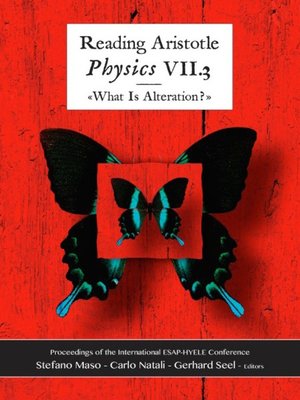
Sign up to save your library
With an OverDrive account, you can save your favorite libraries for at-a-glance information about availability. Find out more about OverDrive accounts.
Find this title in Libby, the library reading app by OverDrive.



Search for a digital library with this title
Title found at these libraries:
| Library Name | Distance |
|---|---|
| Loading... |
This volume presents the results of the ESAP-HYELE conference on "Aristotle, Physics 7.3: What is Alteration?", which took place in Vitznau, Switzerland, 12–15 February 2007. The contributors are part of a team of Aristotelian scholars who came together for the first time in 1995, and have since been meeting every spring. The purpose of their gatherings is to read and interpret line by line a short, but important chapter of Aristotle's works. In this way, attention is focussed on key texts of particular exegetic and theoretical interest. Each session starts with the presentation of a translation and a first analysis of the main problems; these then become the subject of an intense debate which illustrates the different schools of thought and methodological approaches. Over the years, the confrontation of these different points of view has had a beneficiary effect on scholarship and has stimulated research activity worldwide. On the occasion of the Vitznau meeting in 2007, it was decided for the first time to publish the results of the meeting in order to make them accessible to a wider public of scholars and students. The present volume is the fruit of this common effort.
Physics 7.3 is one of the crucial texts in Aristotle's theory of change, in which he deals with the question of what alteration is and what it is not. Aristotle discusses change in various parts of his writings, and seems to provide quite a broad range of notions: movement and change of place, alteration in aspect and form, temporal change, variation in the way a given being is perceived, the change in relationship between beings, qualitative and accidental alterations. The present volume sets out to provide the reader with some new insights in those subjects. It opens with Robert Wardy's introduction, in which the problem of 'change' is inserted in the context of the great debate surrounding the entire Book 7 of Aristotle's Physics. Next it gives Aristotle's text in Greek (accompanied by an English translation) according to the so-called version α in the edition by W. D. Ross (Oxford, 1950) which we slightly modified. Also included is version β of Aristotle's chapter which was known by Simplicius, Philoponus, and Themistius. The main part of the book contains an 'Analysis and Commentary' consisting of 1. Preliminary Remarks by Benjamin Morison and Gerhard Seel concerning the place of chapter 3 in book 7, the structure of the chapter and its main problems; and 2. Commentaries on the six Sections of the Chapter. These six contributions do not represent a simple reproduction of the 2007 conference papers; on the contrary, they are the result of a process of meticulous revision which took into account both the conference discussions and the subsequent correspondence between the participants. Finally there are two appendices: 1. Gerhard Seel, The Logical and Semantic Background of Aristotle's Argument; and 2. Oliver Primavesi, Aristotle, Physics 7.3, 245b3–248a9: Towards a Fuller Synopsis of the Two Versions; the latter facilitates the comparison of the two versions.







